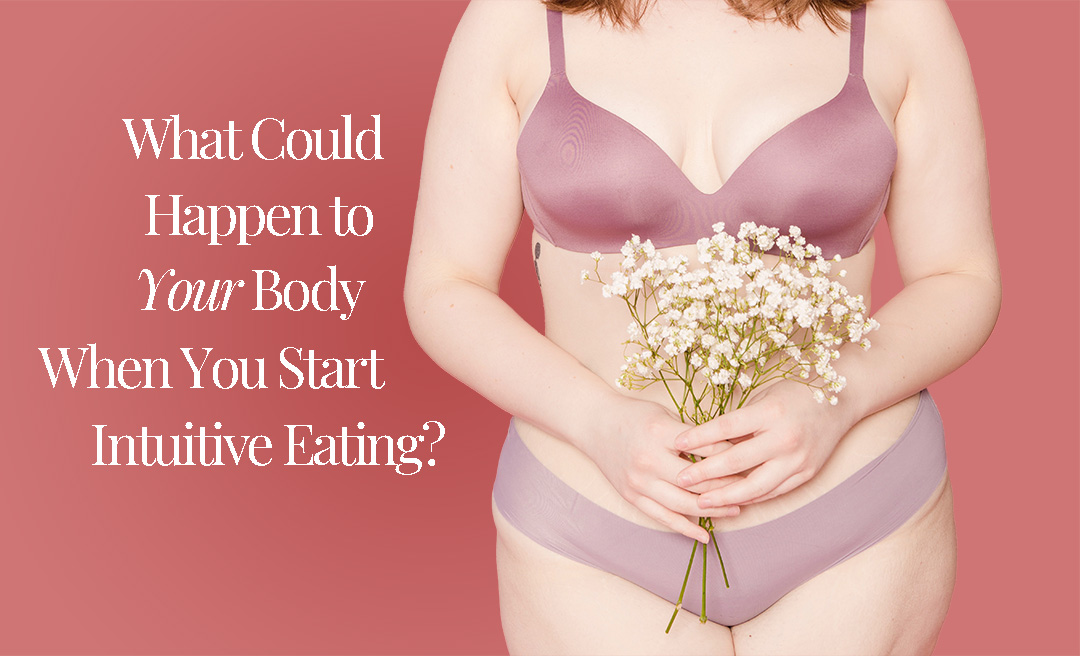
Whether you’ve stumbled upon intuitive eating through social media, or you came to it at the recommendation of a friend or perhaps even a nutritionist, this is probably the big question on your mind, along with, “Can I lose weight with intuitive eating?” Intuitive eating has had quite the buzz the last few years, and many people mistakenly come into it thinking it’s another diet or the latest “wellness” plan. In fact, it’s none of those things. It’s not a diet, and weight loss isn’t the focus of intuitive eating.
Intuitive eating for weight loss is doomed to failure for the same reason all other diets don’t work—restriction is not the answer.
That said, some people do lose weight with intuitive eating. And some people gain weight with intuitive eating. Again, this isn’t the purpose of intuitive eating. The focus is on creating a healthy relationship with food by tuning into your body’s natural hunger and fullness cues. With our diet-obsessed culture, many people see intuitive eating as a refuge from the myriad messages we receive every day about how we should look and how we should eat.
If you’re coming to intuitive eating with the goal of improving your relationship with food or to heal your eating issues, you are in the right place. Understandably, you may be concerned about how this way of eating will affect your weight, and that’s okay. We’ll explore what could happen to your weight while intuitive eating.
Quick disclosure: This article is intended for educational purposes and is not meant to be considered medical advice.
I should preface this by saying that no one knows what will happen to your body when you begin to listen to its hunger and satiety signals. Whether you work with an intuitive eating-certified therapist or dietitian, or you attempt to DIY it, there is no guarantee you will lose weight or gain weight—or gain weight and then lose weight, or lose weight and then gain weight. Intuitive eating founder Evelyn Tribole has stressed that even she can’t predict what will happen to your body.
Since intuitive eating focuses on listening to your body’s hunger and fullness cues, it requires patience and trust. While you may hope to have weight loss as a goal, as you begin to nourish your body and make peace with yourself, you will probably find that your focus shifts. But let’s get the big questions out of the way.
Is it possible to lose weight through intuitive eating?
Yes, but again, this is not the focus of intuitive eating.
Intuitive eating isn’t “anti-weight loss,” but it’s not a diet either. When you adopt intuitive eating, your body is granted unrestricted access to food, so it’s free to do as it pleases. Yes, that can even include losing weight naturally.
There are various reasons intuitive eaters might experience weight loss:
- They’ve broken away from the binge-restrict cycle that can cause their body to hold on to excess weight.
- They’ve attuned to their body’s hunger and fullness signals, which allows them to eat when they’re hungry and stop when they’re full.
- They’re less stressed around food, which helps their body better regulate the hormones that affect weight.
- They’re practicing body respect, which means a better emotional state, that again means less stress around food.
- When they stop restricting, their body feels “safe enough” to move to a smaller set point weight, which can cause weight loss.
These are just a few of the main reasons people lose weight with intuitive eating.
What happens to your body when you begin intuitive eating?
When you begin practicing intuitive eating, there are three major outcomes as it relates to your body: You lose weight, you gain weight, or you maintain weight.
We discussed the reasons you could lose weight with intuitive eating. It’s also possible you could more or less maintain your current weight while intuitive eating. It’s also possible you could gain weight when you first begin intuitive eating.
Weight gain may happen because:
- Your body’s set point is higher than your weight before starting intuitive eating.
- Years of food restriction may have kept you at a lower body weight, and your body may try to regain weight to reach its natural set point.
Weight gain during intuitive eating is often temporary and often occurs during the honeymoon phase of intuitive eating when you are giving your body permission to eat all the things. This phase is integral to healing your relationship with food, and you cannot skip it. As you continue to allow yourself access to food and no longer attempt to physically AND emotionally deprive your body of food, it eventually settles to its desired weight.
It’s normal to experience a range of emotions when you gain weight, but it’s critical that you trust your body to make peace with it.
Since weight changes are not the primary focus of intuitive eating, you should not base your success on the number on the scale. In fact, I would highly recommend that you don’t weigh yourself. Instead, focus on how you feel, both physically and mentally. Are you feeling more energized and satisfied after meals? Are you able to enjoy your favorite foods without feeling guilty? These are the things that truly matter when practicing intuitive eating.
As you heal your relationship with food—physically, emotionally, and mentally—your body will come to its unique “set point weight,” this is the weight your body sustains naturally without dieting, overeating, or binging. Ultimately, practicing intuitive eating means honoring your body at its natural size and weight.
